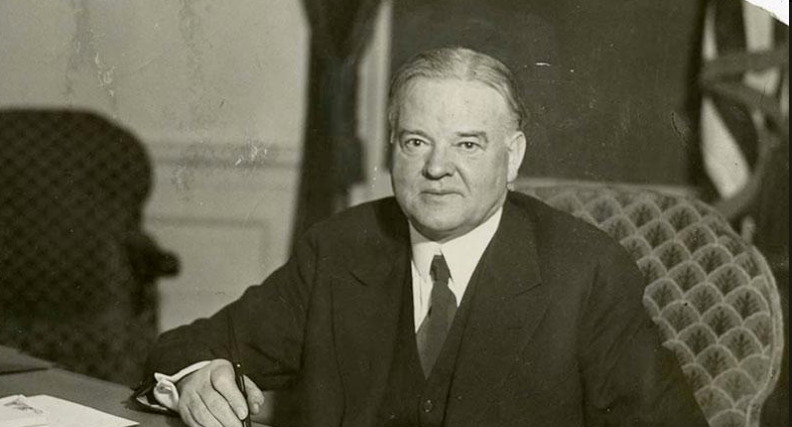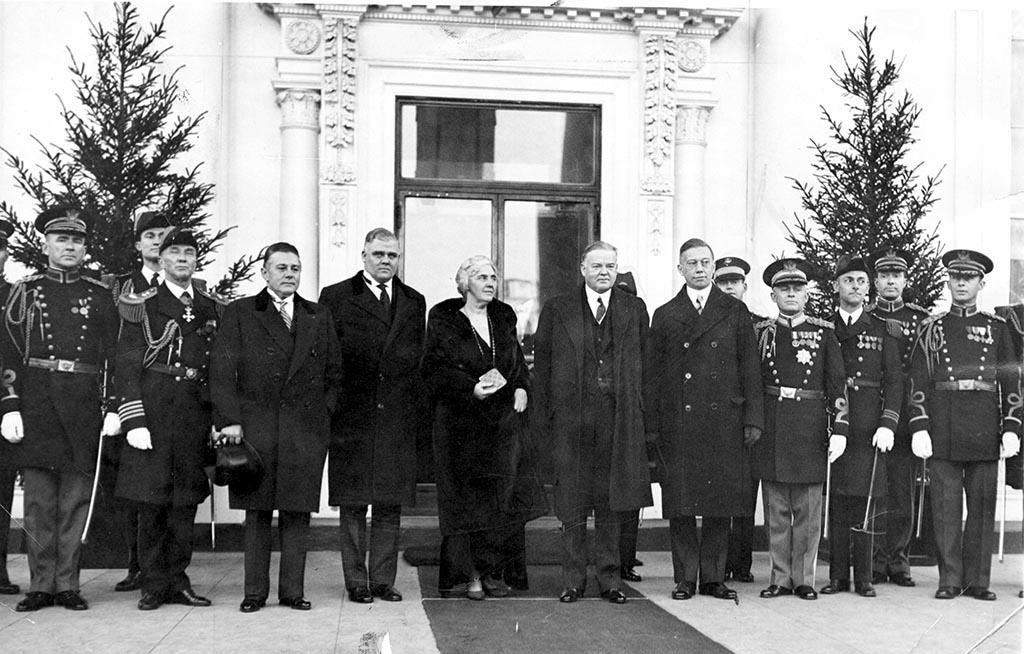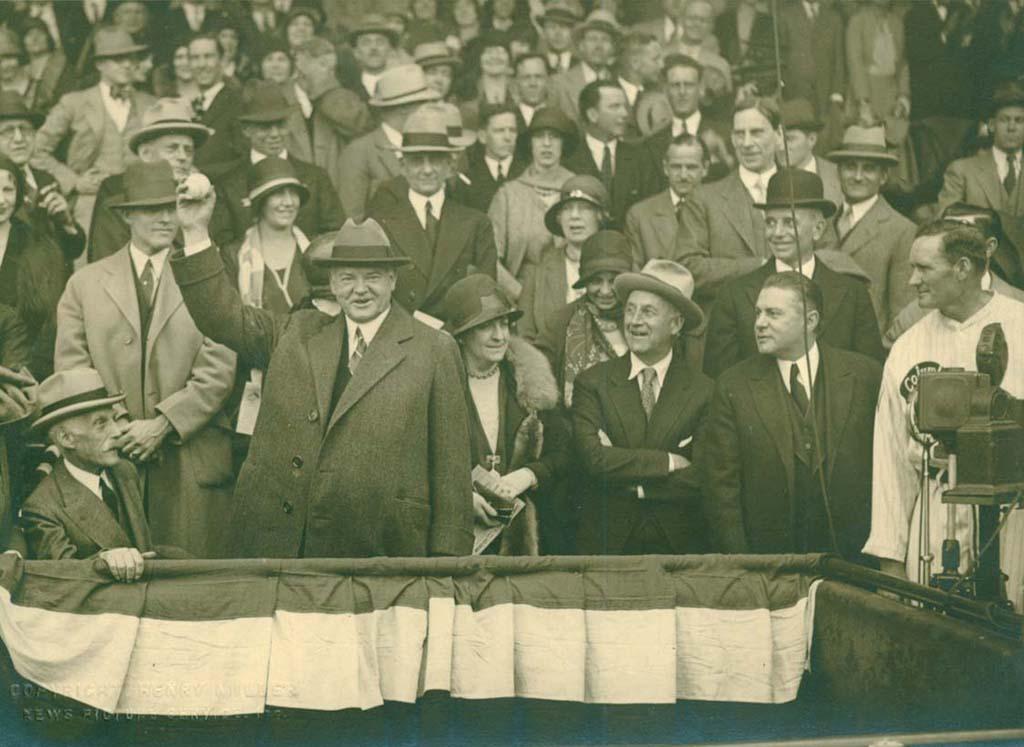Herbert Clark Hoover was born on August 10, 1874, in West Branch, Iowa. His father, Jesse Hoover, was a blacksmith, and his mother, Hulda Minthorn Hoover, was a seamstress. Hoover lost his parents at a young age, subsequently stayed with various relatives, and was finally raised under the care of his uncle, Henry Minthorn, in Oregon.
Throughout his childhood, he became familiar with agriculture and handicrafts, and entered the workforce at a young age. He left school at fourteen to work in his uncle's real estate office. Three years later, in 1891, he enrolled in the newly opened Stanford University to study engineering. Despite performing poorly on the entrance exams, he was admitted and supported himself by working various jobs during his education. He completed his undergraduate degree in geology in 1895.
After graduation, Hoover worked internationally in the engineering profession. He first worked as a mining engineer in Australia, then in China. He served as chief engineer for the Chinese Imperial Bureau of Mines. In 1900, during the Boxer Rebellion, Hoover was in Tientsin and participated in the organization of civilian defense; his wife, Lou Henry Hoover, worked in field hospitals.
From this period onward, he carried out mining investments and engineering activities in many countries worldwide. In 1908, he founded his own mining consulting firm, and by 1914, he had a widespread office network and a significant personal fortune.

Herbert Hoover (Hoover Archives)
Public Service and Pre-Presidency Activities
With the outbreak of World War I, Hoover was in London and organized the evacuation of Americans stranded in Europe due to the war. Later, in response to the food crisis in German-occupied Belgium, he established the "Commission for Relief in Belgium." This organization ensured that the basic needs of millions of people were met through non-governmental resources.
When the United States entered the war in 1917, President Woodrow Wilson appointed Hoover to head the newly established U.S. Food Administration. In this role, Hoover promoted the efficient use of scarce resources through voluntary conservation campaigns at home, and continued relief efforts in Europe after the war ended. As director of the American Relief Administration, he oversaw the organization of food and aid distribution in over twenty countries in continental Europe. In 1921, he also arranged for aid to be sent to the famine-stricken Soviet Union.
In the post-war period, Hoover was proposed as a presidential candidate by both Democratic and Republican circles, and in 1921, he was appointed Secretary of Commerce by President Warren Harding. He continued in this position during President Calvin Coolidge's administration. In his secretarial role, he developed policies on industrial standardization, waste reduction, and the promotion of new technologies. He was particularly effective in regulating new industries such as radio and aviation. He also supported the formation of trade associations, advocating for voluntary economic collaborations to bridge the private sector and the public. In his 1922 work, American Individualism, he defined the principle of individualism as the foundation of social order.

January 1, 1930 New Year's Reception, White House (Hoover Archives)
Presidency, Crisis Management, and Beyond
In 1928, with President Coolidge not seeking re-election, Hoover became the Republican Party's presidential candidate and won the election by a large margin. Shortly after taking office on March 4, 1929, the stock market crashed in October of the same year, and the Great Depression began. The Hoover administration accelerated public investments, proposed tax cuts, and encouraged businesses to maintain employment in response to unemployment and economic contraction. By 1932, the number of unemployed reached 10 million.
Hoover rejected direct aid from the federal government, arguing that local governments and voluntary organizations should undertake these tasks. The Reconstruction Finance Corporation, which he established in 1932, aimed to provide credit to the private sector and state aid programs. Additionally, Federal Home Loan Banks were established to provide support to citizens at risk of losing their homes. However, Hoover's distant stance on direct federal aid policies was negatively perceived by the public, and criticisms intensified, especially as unemployment reached 10 million in 1932. In the elections held that same year, he was defeated by Franklin D. Roosevelt.

1930 - President Hoover throws out the first pitch at the opening game between the Boston Red Sox and the Washington Senators. (Hoover Archives)
After leaving the presidency, Hoover did not completely withdraw from politics; he engaged in various activities through public administration reforms, aid organizations, and think tanks. He chaired two separate federal administrative reform commissions in 1947 and 1953. Additionally, the Hoover War Library, which he founded at Stanford University in 1919, was reorganized in 1957 as the Hoover Institution on War, Revolution and Peace and became a center for academic research.
Throughout his life, Hoover published over forty books, penning his thoughts on social structure and governance. In 1962, he made his last visit to his birthplace, West Branch, attending the opening of the museum established in his name. He passed away in New York on October 20, 1964, and was buried near his birthplace.



